Christian Homeschoolers Are Propelling America’s Hottest New Sport To New Heights
While American physical education programs demonstrably fail the nation’s K-12 students, Christian homeschoolers have found an alternative that’s proven far more effective. The result is that homeschooling is now a driving force behind one of the fastest-growing sports in America: Ninja Warrior.
Since 2009, NBC has broadcast a U.S. version of the Japanese sports reality show “Sasuke” as “American Ninja Warrior.” The dynamic obstacles require a level of skilled athleticism far beyond the basic programming of K-12 gymnasiums. The courses’ difficulties have made both the triumphs and the wipeouts award-winning television with 22 nominations to boast while inspiring a new generation of competitive athletes. Eighteen-year-old Elijah Browning of Tennessee is among them.
A three-time contestant on NBC’s program who nearly made it to the million-dollar rope climb in round four, Browning has been competing in obstacle courses since he was 10.
“I’d always grown up watching the show ever since I was 5, 6, 7 years old,” Browning said in a sitdown interview with The Federalist before another competition just south of Denver, Colorado. Then, “me and my mom started finding competitions all over the country for the leagues outside of Ninja Warrior.”
Beyond the Screen
While most Americans associate the competition with what they see on NBC, Ninja Warrior has exploded as a sport in its own right with leagues popping up around the country beyond the glitzy production of primetime television. There’s now the World Ninja League (WNL), Ultimate Ninja Athlete Association, Wolfpack Ninjas, Ninja Challenge League, Ninja Sport Network, Federation of International Ninja Athletics, Next Level Ninja Games, and Ninja World Cup, just to name a few. Apart from the million-dollar prize on NBC, participants can win tens of thousands of dollars competing in third-party tournaments.
Browning started experimenting with ninja games when his grandfather constructed obstacles at a family farm. A builder for more than 40 years, his grandfather reconstructed common hurdles from the show that have become staples in the sport both on and off the airwaves — from the salmon ladder to the cliffhanger.

“Lucky for me,” said Browning with a smile between sips of coffee. “We started at his house because he had already built these like elaborate tree houses for me, so we were like, adding all these obstacles to the tree houses.”
Also lucky for Browning was his mom’s decision to choose homeschooling over public school, which allowed Browning and his 14-year-old brother, Julian, to take the sport seriously. Browning has now trained and competed in 136 ninja gyms across 35 states and three different countries.
“Most of those [contestants] that are really competitive and serious are homeschooled because you have to travel so much to compete,” Browning said. “You have to travel to stay relevant and compete, and you really can’t take a season off.”
The televised program films from March through May. But beyond the show are dozens of other leagues holding competitions throughout the year. Browning maintains a rigorous training schedule of two- to three-hour workouts six days a week. It’s a workout regimen that sets Browning far apart from the less than 1 in 4 U.S. high school students who are physically active for at least 60 minutes on a daily basis. It’s also a grueling regimen that Leila Smith’s two homeschooled Illinois teens are intimately familiar with.
Tyler Smith, 17, has been on the podium for ninja games at least 110 times, and his 14-year-old sister, Sydney, at least 62. To the family’s frustration, however, Tyler has yet to be on the show, and Sydney is still too young. NBC’s eligibility cutoff begins at 15. Sydney, their mother says, has a much better chance by virtue of her sex.
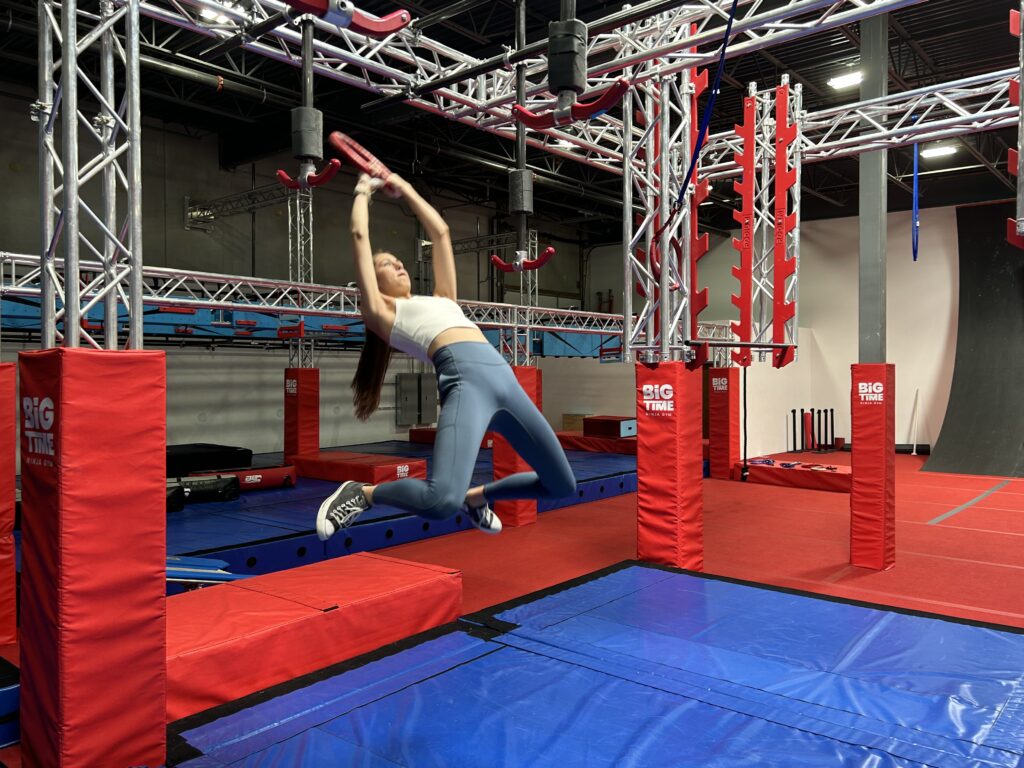
While Tyler has applied for the televised league twice, the reality is that NBC is still producing reality TV. Guests are featured with generous introductions, put together by producers, before they tackle the obstacles in front of millions watching at home. As a white, midwestern male in a male-dominated sport, Tyler has struggled to grab casting producers’ attention despite his record as one of the best teenage athletes in the sport. Ethan Swanson, a nine-time NBC contestant who now coaches other athletes on the outskirts of Chicago, says Tyler’s title as the “most acclaimed” teenage ninja in the country is “indisputable.”
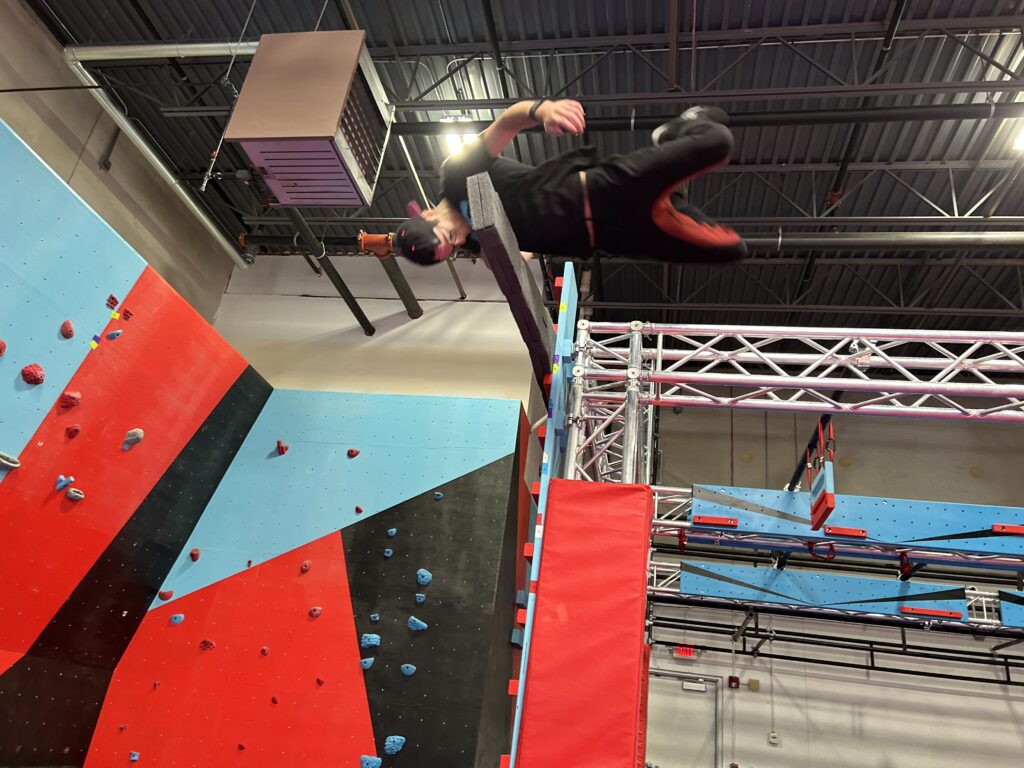
Tyler’s tough luck has led the family to prioritize outside leagues over legacy TV. At 17, Tyler was able to buy his first car outright after having made $20,000 from competitions. He bought an Audi A7 entirely with his prize cash. While it might seem like a large sum for a 17-year-old kid, Tyler’s $20,000 winnings reflect a sport that’s still growing. Obstacle course competitions are not yet commercialized with the support of the National Collegiate Athletic Association (NCAA), so there are no six-figure scholarships to dish out to high-performing high schoolers. Tyler’s financial success, Swanson said, is by far the “high-water mark.” Even then, it’s no full-time salary after graduation.
Ninjas on a Mission
Christian homeschoolers are trailblazing the growth of competitive ninja leagues in the meantime. Browning’s mom, Renee, called the sport’s expansion “exponential.”
“The Christian homeschool community is always looking for outlets for their kids that are unique and uplifting and encouraging, and that is 100 percent what this sport is,” Renee said. “It’s not cutthroat and mean, like it’s all a bunch of incredible families, and I think that’s appealing to the Christian homeschooling world.”
Leila Smith offered a similar assessment about the sport’s popularity among Christian homeschoolers, calling the community “tight-knit” with a camaraderie of “ninja moms.”
“Knowing that there were Christian families kept us in the sport more,” she said.
Christian ninjas have congregated in Colorado Springs for the past two years to participate in “Warriors on a Mission.” The annual conference features a worship service, book signings, and speakers on how faith has guided athletes’ journey through obstacle courses.
The event is put on by Suzanne Himka, a 53-year-old grandmother who herself still trains and competes in obstacle races. Earlier this month, Himka captured the gold medal in the Mammoth Lakes Obstacle Course Racing World Championships in California. In Colorado Springs, she operates a faith-based gym called Lost Island Warrior where she coaches a team of about 50 competitive athletes and another team of exclusively homeschoolers. The annual conference is her way to “spread the gospel through ninja,” she told The Federalist.
“It’s more than ninja, it’s ministry,” Himka said.
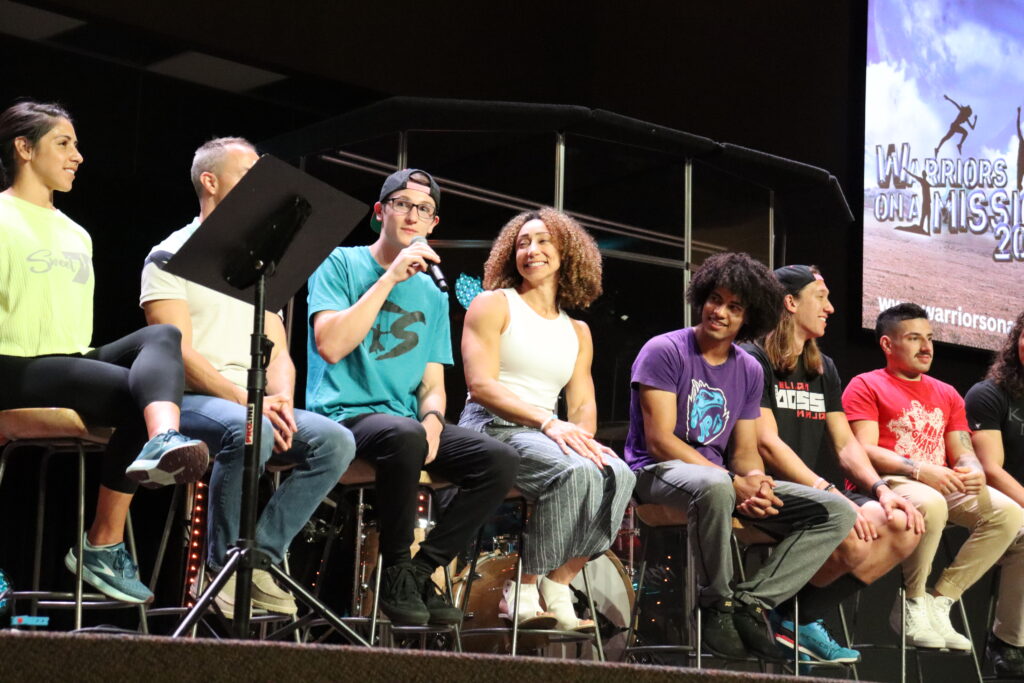
Both Tyler Smith and Elijah Browning were speakers at this year’s conference in June. Next year, Himka plans to hold the conference in Anaheim, California, to coincide with the Ultimate Ninja Athlete Association World Championships so more athletes can attend.
“So many want to come out,” she said, but “it is a big cost.” Himka has spent upwards of $10,000 to help families cover flights and accommodations, but “it’s hard because I’m the only one doing it by myself.”
Himka said 50-85 kids have made professions of Christian faith at the camp every year, and she hopes to keep it running on an annual basis. She speaks regularly to her everyday students and those who come to camp about the analogies between the Bible and overcoming the sport’s obstacles.
“There’s so many analogies,” she said. For example, if kids spend their life looking downward and at a screen instead of upward and outward, “then you’re going to miss a lot of stuff.”
Ninja Inc.
Professional ninjas don’t make a living competing, but the proliferation of the sport has still led prior show contestants to open gyms of their own. The physical demands of the obstacle courses require a unique versatility that leads athletes to peak even earlier than in more popular sports, such as baseball and basketball.
Swanson opened his own gym, Big Time Ninja, in a Chicago suburb with Chris DiGangi, a 12-time contestant on NBC. The facility opened in February after the pair had already hit two dozen buzzers between them and have now chosen to coach the next generation of athletes.
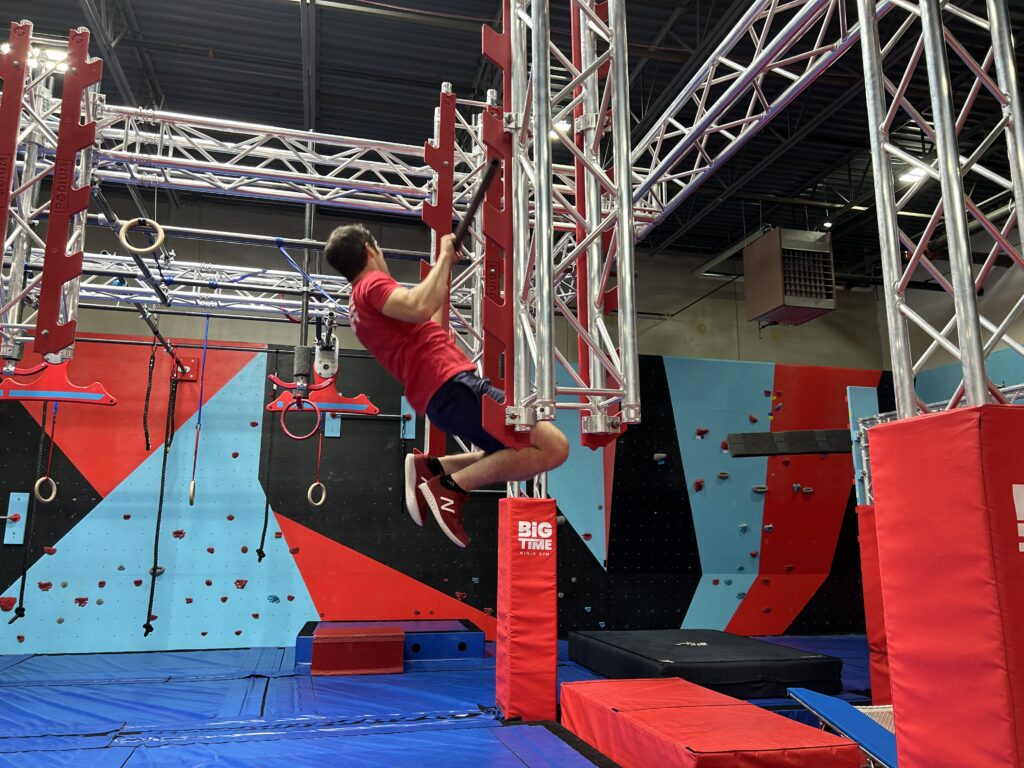
Swanson told The Federalist the top athletes in the sport right now are between ages 16 and 22.
“I think that’s going to increase in the next five years,” he added, crediting advanced facilities such as Big Time Ninja “that offer way more to these kids coming up in the sport.” Swanson estimates the peak age range will shift upward to 17-25.
“All these kids that are learning have better coaches,” he said. “When I was training, I didn’t have a coach.”
But now, even the top teen athletes have begun their careers in coaching. Elijah Browning coaches other ninjas at a gym he launched in Tennessee called Overcome The World. He said about half of his students are homeschooled. Tyler Smith also coaches a team in Illinois on Wednesdays. In Colorado, however, the career of one full-time coach serves as inspiration for athletes who might think competing is beyond their reach.
Just east of Boulder, Nate Hansen, a five-time contestant on NBC, began working at “Ninja Nation” two years before his first invitation for the televised obstacle-course competition. Now known as “Gnarly Nate,” Hansen worked his way from birthday party host in 2018 to head coach at the facility today.
In 2020, Hansen smashed the buzzer on his first run through the course, fulfilling a lifelong mission.
“I was like, ‘This could be the peak of my life,’” Hansen recalled. Despite falling on the fourth obstacle the next day, “that season was definitely like one of the peak moments in my life because it was the time that I got to first execute my dream.”
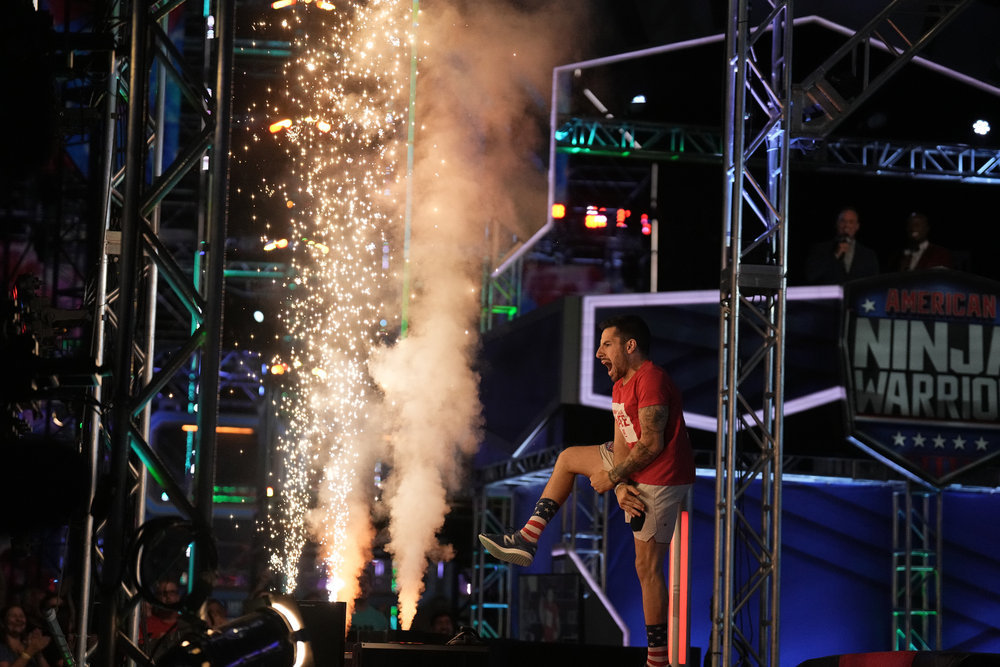
AMERICAN NINJA WARRIOR | National Finals 3 | Episode 1412 | Pictured: Nate Hansen
Image CreditElizabeth Morris/NBC
Yet by every measure, biology was stacked against him becoming a professional athlete. Hansen was born with growth hormone deficiency. Also known as dwarfism or pituitary dwarfism, GHD is a rare condition in which affected individuals develop shorter limbs and stature because the body fails to produce enough growth hormones.
“I’m at a severe disadvantage at times being only five-two,” Hansen explained. “I can’t jump as far as, you know, a six-foot-tall athlete.” At the same time, he added, “I honestly appreciate that I weigh less than most athletes.”
The wide variety of obstacles compel athletes to train for an entire range of possibilities on the course and often require just as much climbing as they do reaching. The variation in hurdles means a tall, heavy, athletic body-builder might find it easier to run up the warped wall but more difficult to hurl himself over. An athlete with a lighter stature, on the other hand, probably has an easier time lifting himself through the course.
Yet for all of the disadvantages handed to him by GHD, Hansen defied the odds “by the grace of God” to “show the talent that I’ve been gifted.”
Hansen was among the speakers at this year’s Christian ninja conference in Colorado Springs and credits his faith for carrying him through his athletic career.
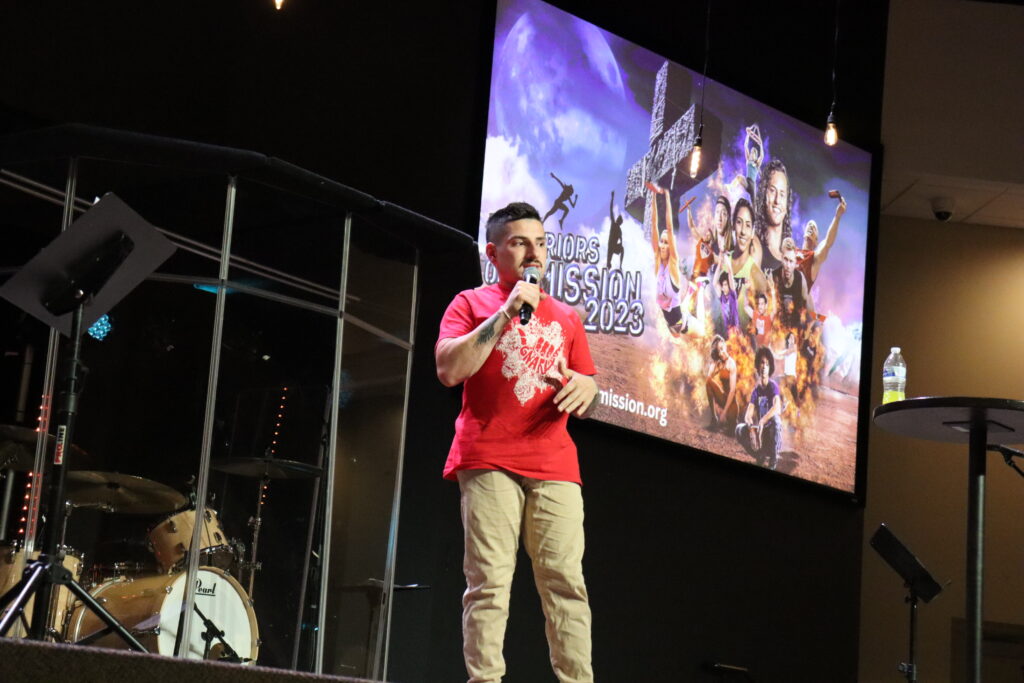
“There’s been times where I’m on the Ninja Warrior course that I don’t feel the best or I feel sick, but I just ask that God carry me through and He does,” Hansen said. “Sometimes you fall and there’s lessons to be learned in that too. Sometimes God uses our faults and failures to teach us the most valuable lessons.”
Now Hansen coaches kids on obstacle courses north of Denver, including a handful of homeschoolers. He also has students who similarly struggle with GHD.
“That’s really cool because, you know, I wish I had a role model and a hero with what I had when I was growing up,” Hansen said. “I can kind of motivate and inspire them as young little kids, you know, and say, ‘Hey it’s OK. You’re going to get bullied. You’re going to get pushed down. But you can still do anything.’”
On to the Olympics
Kids who compete in ninja leagues today might even participate in the Olympics.
The 2028 summer games in Los Angeles are on track to feature the first-ever obstacle-course competition in the international series of tournaments.
Ninja Warrior’s signature obstacle course is being tested for possible inclusion in the Los Angeles 2028 Olympic Games. https://t.co/xvJ8dZ299L pic.twitter.com/lnTN3BHboR
— IGN (@IGN) June 27, 2022
Terry England, an obstacle-course coach based in New Orleans, told The Federalist the sport will likely be tested in Los Angeles as a replacement for equestrian in the modern pentathlon. The Paris games next summer will be the final year the modern pentathlon will be a five-event sport that includes fencing, swimming, horseback riding, pistol shooting, and running, which were selected to reflect the skills of 19th-century cavalry.
According to NBC, athletes will compete in 10 obstacles up to 100 meters long. Potential hurdles include a rope swing, monkey bars, a rings rig, and a balance beam.
England, which serves on the USA Ninjas Association, is on a committee trying to elevate the sport to Olympic status.
“What does that mean for teen ninjas?” England said. An 8-year-old who has a very good ninja background, he explained, might have a chance to compete on the world stage. “If this 8-year-old can run and swim, then they already have three of the disciplines that are learned to become a pentathlete.”
Exactly why equestrian will be replaced remains unclear, England said. But for ninja, “future Olympics can add events so that there can be longer races, different styles, and team relays in such that would branch out.”
The sport’s addition to the Olympic lineup might also open the door to the league being adopted by American universities. If viewership is good enough, obstacle-course racing may transform from a minor-league hobby with its own television show to a global sport backed by the NCAA. With that would come an even greater flood of interest and money into the sport, including the six-figure scholarships today’s top-tier ninja athletes currently miss out on.
The Olympics may help further popularize Ninja Warrior, but until then, Tyler Smith says he’s ready to compete for “as long as I can.”





Comments are closed.